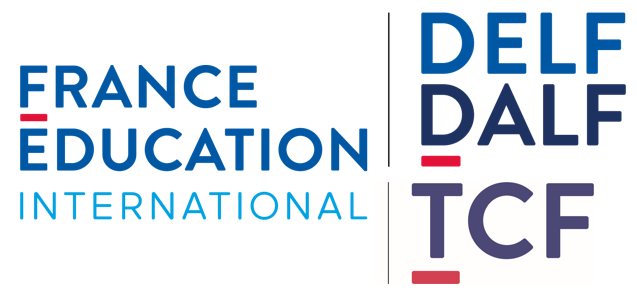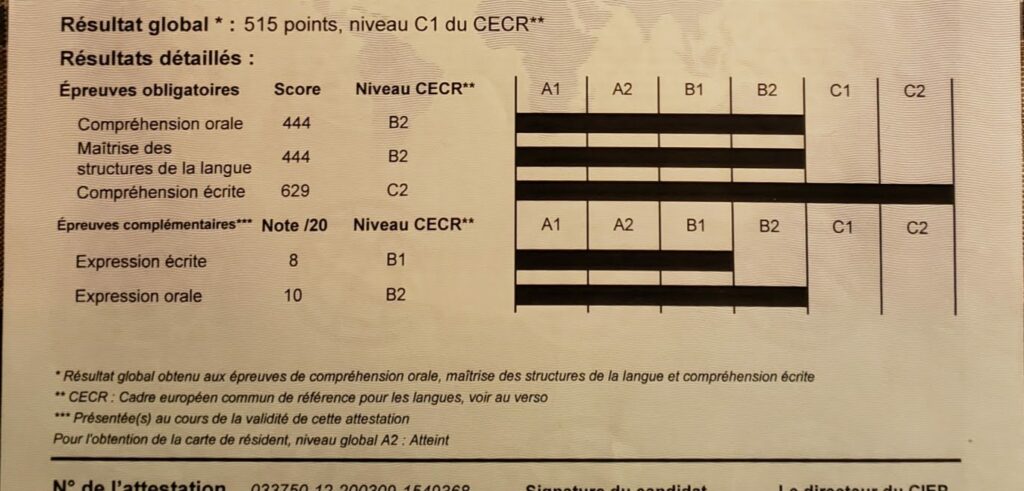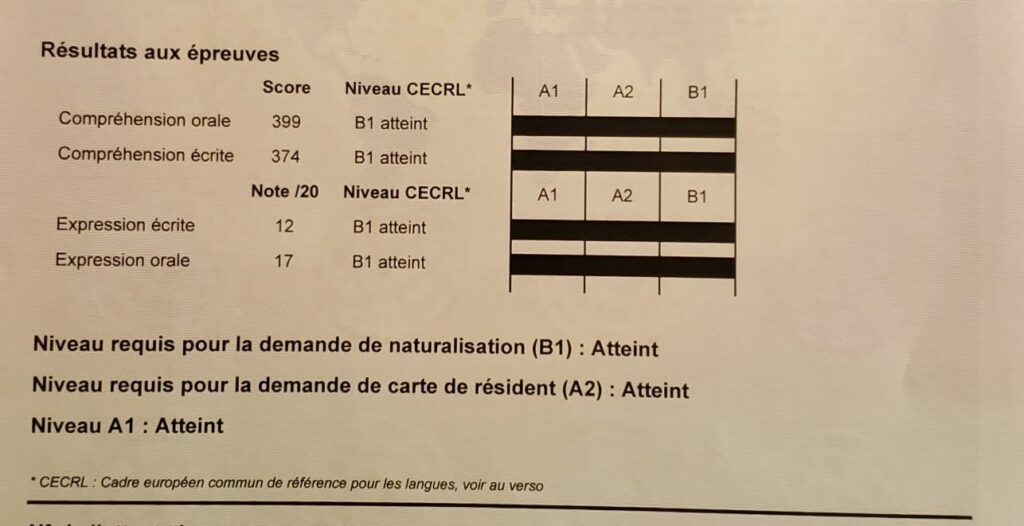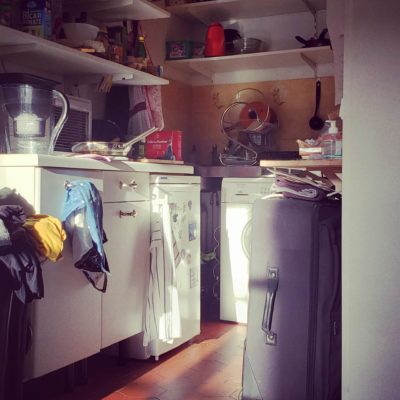Taking the TCF for my carte de résidence application

There are certain French administrative tasks that you will need to have a language certificate to prove your level of the French language. There’s several tests that can do this and depending on your situation depends on which one suits your needs.
TCF, DELF, DALF?
The CECRL (Common European Framework of Reference for Languages) has established 3 main levels of the language (A, B, C) and each level is broken down into 2 stages (1 and 2). There are several different ways to test for your level of French. All of these tests cover a variety of subjects that are meant to evaluate the test taker’s ability to communicate and express themselves, written and orally, in French.
Depending on your situation and needs, depends on which test you will need to take. Please do your research on all types of tests to see which suites your needs best.
TCF
Known as the Test de Connaissance du Français, a written and oral test that is offered on a more frequent basis throughout the year. The TCF has two different options: TCF “tout public” (all public) and the TCF IRN (Integration, Residence, and Nationality).
TCF TP
This test is used for a variety of reasons: academic, professional and personal. This test, in conjunction with the written examination, is used for the test when wanting to enter into the French higher education system. This tests in 5 different areas and you are given a score in each area. You are also given a global score based on the average of the 5 areas and their appropriate scores.
TCF IRN
The test is used for 3 main reasons: validating at least an A1 level for OFII, applying for a long-term residency permit, and applying for French Nationality. This test is comprised 4 areas and only tests up to B1 level. This follows the same process as the TCF TP, but there is 1 less area of assessment.
You can find out more about options here from the ELFE website (where I took my test twice).
DELF
This written test is known as the Diplôme d’études en langue française and is organized by the France Éducation International a part of the French Ministry of Education. This tests specific levels A1, A2, B1, and B2. This test can be taken by anyone, but is mainly for young adults and adults who wish to know their level for either personal or professional reasons. When you take this test, you will receive a diploma that is valid for life. You need to pass a level B1 to be able to obtain French Nationality. The DELF is not offered as often as the TCF, so you will need to be on top of dates and times available. You can check out Alliance Française for more information on these tests.
DALF
This written test is known as the Diplôme approfondi de langue française and is organised by the France Éducation International a part of the French Ministry of Education. This tests only on levels C1 and C2, a proficiency that is equivalent to autonomous and/or mastery level. Those that can take this test are the same as the DELF, as well as the reasons. The DALF has a similar schedule like the DELF, where it is only offered at certain times during the year. You can find out more here.
Taking my TCF IRN
This is not my first time taking the TCF test. I had scheduled a TCF TP for within my first week of moving to Paris back in 2020. I wanted to have a certificate with my level of the French language that I could put on my CV for when I started looking for a job. I find the two tests (TCF TP and TCF IRN) pretty similar in the process.
I took both tests at the Ecole de Langue Française (ELFE) which is located near Châtelet Les Halles. I chose this school because it was not too far from my apartment. The registration process was super easy (online) and affordable (152€), compared to other offers. The registration process is in French, so some level of the French language is necessary.
I signed up both times online here by clicking the s’inscrire. This is the main inscription page for all the options of TCF TP and TCF IRN. There’s a form you’ll need to fill out and you’ll need to provide photo ID (front and back). Once you’ve selected the test type and filled out the form, you’ll be able to choose your date and time. Once I had completed the form, I received a confirmation and convocation via email that I needed to print out and bring with me. the day of the test, as well as my ID, headphones, and a pen.
The day of the test
I arrived to the school 15 minutes before my scheduled time on the convocation at 9 AM. The ELFE school is located on Rue Montmartre, right across from La Comptoir de la Gastronomie. It is at the end of the courtyard. For the TCF IRN, we were asked to sit in the waiting room until the instructor came down. The registration process took an hour, we had to wait our turn to be called up to the reception desk by the instructor so we could verify our information (name, email, phone number, address, etc). Our photo was also taken; this will be used on the certificate that we will receive when we get our scores. Thank goodness I brought my book!
Once everyone was registered, we went up to the examination room. We were asked to leave our personal affairs in a a coat room (only bring our IDs, headphones, and pens) and the rest would be locked during the duration of the exam. We were told to sit at any computer and plug our headphones in. This portion of the test covered reading comprehension, listening, and written expression. There were various types of formats; from reading a portion of a text and answering questions about it, hearing clips of audio and responding accordingly, and answering a variety of other questions.
Each section was timed and once the time was up, you are not allowed to go back and change answers. There is some extra time at the end of each question to make sure that you have all the time to finish the questions. If you finish before the time limit for the section is over, you can go back and check your answers here too if you’d like. If you ever get done early and are confident in your responses, you are allowed to signal to the examen proctor that you’re ready to move on to the next part.
When I took the TCF TP test in March 2020, our oral part was first and then our written/listening part last. There was also only 4 of us at that time taking the test. For the TCF IRN there were about 20 of us taking the test and we started with the written/listening part and then moved to the oral part. The oral section comprised of 3 exercises, all recorded to be reviewed later by the board. The first exercise was a simple introduction about yourself. You had 3 minutes to talk about yourself. I ended up rattling on and on and I am sure bored the instructor to death. If I got stuck or seemed like I wasn’t sure where to go next, she’d ask a question and get me talking again.
The other 2 exercises were a back and forth dialogue where I had to do most of the talking. One was about asking questions to my neighbor about watching her cat during vacation and the other was about booking a vacation through a rental agency. Throughout our conversation, the instructor was noting things down and grading me on my form paper. Once I was done, she dismissed me.
At the end of the test, I checked in with the reception to see if there’s anything else I needed to do. They told me that I would be notified via email in about 3-4 weeks time for my results. When I came back to pick up my results, I needed to show reception my ID and they retrieved my examen certificate. I had to sign a form saying that I picked it up. And that was that. My certificate is good for the newt two years and should carry me through my nationality request in the very near future.


Extra Resources


You May Also Like

Visiting and living in Paris on a budget: Tips and tricks on how to save money.
28 February 2022
Fêtes Galantes Versailles : A Gilded Evening at the Château de Versailles
18 June 2025
One Comment
Pingback: